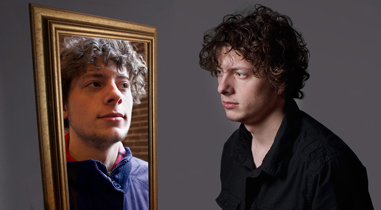Michael had chosen psychology, switched to political sciences and switched back again to psychology. His study career wasn’t without glitches. ‘I put all my energy into keeping up a front.’
After secondary school Michael studied applied psychology. All went well, until he came to the methodology course. That crushed his motivation, on top of which psychology didn’t meet his expectations. ‘I had chosen to study psychology in order to develop my interpersonal skills. Because it didn’t offer the depth I was looking for, I switched to political sciences after eighteen months. I finished with a lot of things at that time: I broke up with my girlfriend, I moved to Amsterdam and I found myself a new part time job.’
Right from the start political sciences didn’t go well and Michael didn’t earn any credit points. ‘I just couldn’t work my way through the textbooks. Everything was a tremendous effort, even getting out of bed. I found it difficult to take things on and finish them and I had a tendency for escapism: surfing the net, gaming, or going out with friends.’
Dramatic
It took a long time for Michael to admit things weren’t going well. ‘If it became apparent half way through the semester that I was going to fail, I would prepare for the next semester and focus entirely on that. I fooled myself that way over and over.’
‘Since my time at secondary school I had been used to being very good at certain things: I was on a debating team and I was good at music, things like that. I derived my self-image from that. It’s so dramatic when that falls apart. You have to start basing your right to exist and your self-esteem on something else.’
Image
‘I was actually doing very badly, but I didn’t dare admit that to the people around me. I put all my energy into keeping up a front. I spent a lot of extra time on my part time job and on my friends, to show things were fine.’
In order to live up to the image of successful student, Michael kept taking on more. ‘All around me I saw people doing things outside of their studies and I felt I should take on more as well. I had to prove I was a capable student. Of course that didn’t feel right. But still I didn’t tell anyone that I wasn’t passing any exams. The only one who would question me was the mother of a good friend. It was hard to lie about it, but I did, because I couldn’t admit to how bad things really were. It took me over four years to accept how bad things were.
Student grant problems
‘Then my student grant ran out and that made me think. I had no money and something needed to happen. I couldn’t continue my anonymous life. That was a reality check that really made me face up to the facts.’
After a long period of doubt Michael finally sought help with his friend’s parents. ‘Together we made a plan for all the things I needed to do that summer, including find out what I wanted to study. That turned out to be psychology again.
Psychology again
He is a second year psychology student now. ‘Studying is going better now, despite having had a tremendous blow to my self-confidence. I have a clear goal now: I want to complete a master in clinical psychology. I didn’t have that prospect when I studied psychology the first time round.’
His time as a student has changed him in many ways. But it has taught him a lot as well. ‘The most important thing I have learned is that you don’t have to prove yourself all the time.’ Michael: ‘If I could do it all again, of course I would do it differently. Because I don’t receive a student grant anymore, I have to work hard to pay my tuition fees. But those four years haven’t been wasted. Because I want to work in the welfare services in the future, it’s good that I’m not a blank sheet of paper. My experiences can help me when I encounter people who have become stuck themselves. That’s useful.’



 print version
print version